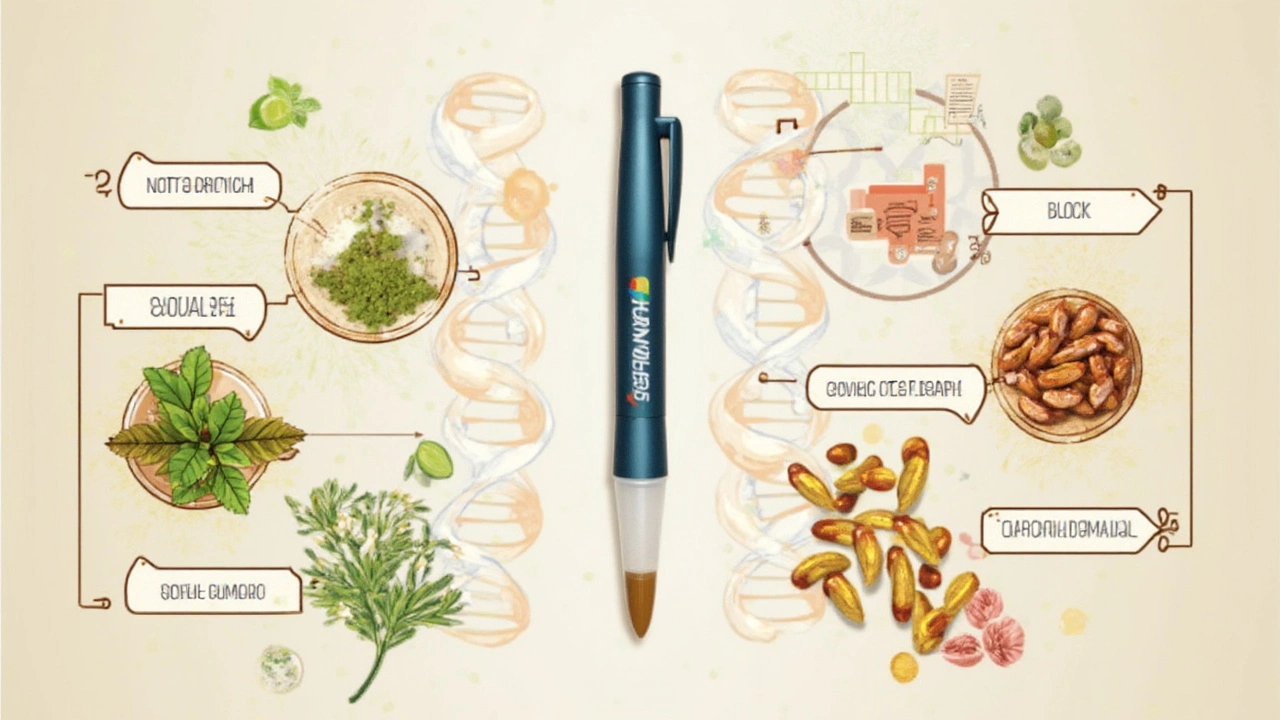
Some people will do almost anything to lose stubborn pounds—even if it means waiting weeks for a doctor's appointment just to get prescribed Ozempic. Problem is, not everyone qualifies or wants to go down the full-blown medication road. So, people often ask: is there anything over-the-counter that can give you similar weight loss effects without a prescription? This question has only gotten louder as Ozempic has become practically a household name—it's in the news, on podcasts, even popping up in memes. But is the answer just a click away on the supplement aisle or are we being sold dreams in a bottle?
Why Has Ozempic Stolen the Spotlight In the First Place?
Ozempic, also known as semaglutide, isn’t just hype—it’s a science-backed GLP-1 receptor agonist that genuinely changes hunger and how your body handles food. It was developed to help people with type 2 diabetes keep their blood sugar in check, but its reputation for impressive weight loss took on a life of its own. Celebrities, Reddit threads, your neighbor with the new jawline—everyone’s talking about it, but what exactly does it do?
When you take Ozempic, it mimics a hormone in your body called GLP-1. This hormone tells your brain, "Hey, you’re full," even when you maybe aren’t. It also slows digestion, so food hangs around in your stomach longer, making you feel satisfied with smaller portions. According to a large 2022 study published in The New England Journal of Medicine, people without diabetes using semaglutide lost around 15% of their body weight on average—a jaw-dropping result by most standards. The data in the table below compares that to typical outcomes for other popular weight loss medications:
| Medication | Average Weight Loss (%) | Main Side Effects |
|---|---|---|
| Ozempic (Semaglutide) | 15 | Nausea, vomiting, diarrhea |
| Contrave | 5 | Constipation, headache, dry mouth |
| Phentermine | 7 | Increased heart rate, insomnia |
| Qsymia | 10 | Tingling, dizziness, dry mouth |
That’s why Ozempic has become "the one to beat." But can anything over-the-counter come close to these numbers or this mechanism?
What On Earth Comes Close to a GLP-1 Mimetic Without a Prescription?
If you look at the shelves in any supermarket or scroll through Amazon, you’ll see mountains of products promising fast weight loss. But none are semaglutide. In the U.S. (and really anywhere else with strict drug laws), you simply can’t get actual GLP-1 agonists like Ozempic over-the-counter. If you see a supplement claiming to be just like Ozempic, put your wallet away—it’s not legit. What you’re getting is something different, usually relying on old-school approaches: reducing appetite, blocking carb absorption, or burning fat.
The Ozempic results come from a very specific action in your body—raising those GLP-1 hormone levels. Over-the-counter supplements that claim to "boost GLP-1" mostly use plant extracts or fiber, banking on the idea that slowing digestion or blunting hunger will get you similar benefits. For example, berberine—sometimes called “nature’s Ozempic” in media headlines—has shown promise in some studies for lowering blood sugar and helping with modest weight loss, but we’re talking a few pounds, not major changes. Konjac root (glucomannan) fiber, another trendy pick, does produce feelings of fullness and minor weight loss, but again, it’s nothing as dramatic as semaglutide. Here’s how their effects stack up:
| OTC Ingredient | Evidence for Weight Loss | Average Reported Loss |
|---|---|---|
| Berberine | Moderate, based on small studies | 2-5% body weight over a few months |
| Glucomannan (Konjac Root) | Small, seen in fiber satiety trials | 2-4 pounds over 8-12 weeks |
| Caffeine/Green Tea Extract | Mild, boosts calorie burning | Up to 3 pounds compared to placebo |
So, while a few of these OTC ingredients nudge the scale in the right direction, there’s nothing out there you can buy without a doctor that's as powerful or as direct as semaglutide at turning down appetite and causing real, consistent weight loss for most users. There’s also another catch: supplement purity and quality control is a wild west—one study found that over 20% of weight loss supplements tested in the U.S. contained unlabeled ingredients, including banned pharmaceuticals. So you need to know exactly what you’re getting.

Decoding Popular Over-the-Counter Alternatives—Are Any Actually Worth Your Time?
Let’s say you still want to try something safe and legal but skip the doctor’s office. Here’s how the main “Ozempic alternatives” on store shelves stack up:
- Berberine: This plant compound is found in goldenseal and barberry. It’s best known for modestly lowering blood sugar, with a handful of decent studies showing it can help overweight people drop a few pounds. It acts partly like metformin, another diabetes med, but isn’t as potent or targeted as Ozempic. For good results, you’d need around 1,000-1,500 mg daily, split in two or three doses (with food to avoid stomach upset). You might feel less hungry and get some weight benefit, but don’t expect miracles. Warning: it can mess with other meds, so double check with your pharmacist.
- Konjac Root (Glucomannan): Think of this as a super-fiber. Konjac root expands in your stomach, helping you feel full so you eat less at meals. Some trials suggest people may lose a couple of pounds over a few months, especially when taken before meals with plenty of water. Go with powders or capsules, but start slow—too much can cause bloating or, rarely, choking if you don’t drink enough water.
- Caffeine/Green Tea Extract: These are old-school boosters you find in most "fat burner" formulas. Caffeine does ramp up energy and can curb appetite slightly, and green tea extract amps up calorie burning, although not everyone gets noticeable effects. Be careful with your daily dose, though—restless nights or shakiness are common if you overdo it, especially for coffee lovers.
- Fiber Blends: Psyllium husk or other fiber singles are safe, cheap, and great for most people’s digestion. They support fullness, which can help with calorie control, and have side perks like lowering cholesterol. Mix them in water or add to smoothies, but always hydrate properly or you’ll end up more stalled than slimmed down.
- Apple Cider Vinegar: Social media loves it, but studies only show tiny effects, if any, on actual pounds lost. If you do want to give it a shot, dilute it heavily (it’s rough on teeth and esophagus straight up), and don’t expect it to be anything close to a GLP-1 agonist.
When you go hunting for the closest thing to Ozempic over the counter, the hard truth is there’s nothing that rivals it head-to-head. Most options offer small, gradual changes at best. The biggest pitfall? Thinking that the words "natural," "GLP-1 booster," or "ozempic alternative" mean the magic will happen. If it sounds too good to be true, it probably is. And don’t ignore the warning labels—unregulated supplements might interact dangerously with prescription meds or carry hidden side effects.
If You’re Still Curious: Smart Ways to Pick and Use OTC Weight Loss Aids
Got your heart set on trying something nonprescription anyway? Here’s how to get the most benefit—and avoid getting scammed or sick:
- Always check third-party lab testing for purity whenever possible. Look for symbols like USP or NSF to make sure what you're swallowing is actually what it claims to be.
- Avoid any OTC product claiming “prescription strength” or that actually uses the words “semaglutide,” “Wegovy,” or “Ozempic” on the label. That’s a huge red flag for fraud—legit supplement brands don’t do this.
- Don’t “stack” supplements (like popping caffeine, green tea, AND fiber) unless you know how your body will react, especially if you have health conditions.
- Always pair any supplement approach with the real game-changers: a diet with enough protein and fiber, regular movement, and enough sleep. Supplements without these basics rarely do anything meaningful.
- Ask your doctor before starting anything, especially if you’re taking medications for blood pressure, diabetes, or mood—many OTC products don’t play nice with prescription drugs.
One last honest bit: while my dog Charlie absolutely refuses to stop stealing snacks off the counter, most of us can't get away with that sort of eating and expect to lose weight. If you're serious about results, patience is part of the deal. Realistically, none of these OTC options will recreate the hormonal wizardry of Ozempic, but they can support other healthy habits and maybe speed up progress a bit. Don’t fall for fake hype—rely on solid research and your own common sense. Being smart about choices will save you time, money, and disappointment down the line.
If you’re still tempted by the possibility of an Ozempic-like result from an over-the-counter option, remember: the closest thing you’ll find is a combination of a few high-fiber supplements, regular exercise, and smarter meals. Maybe boring, but consistently proven to actually work—without sneaky side effects.







